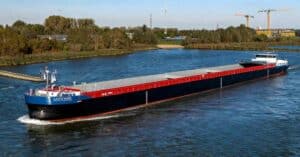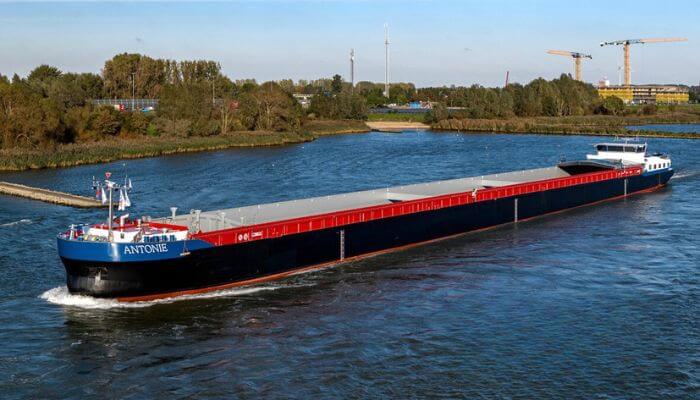
Indian Navy Launches 4th Anti-Submarine Waterfare Craft ‘Amini’
November 17, 2023
U.S Navy To Introduce New Technology For Undersea Fleet Including Cloud Computing for Submarines
November 17, 2023
In history, Lenten Scheepvaart of the Netherlands will be remembered as the owner of the first newly constructed hydrogen-enabled inland shipping barge. By doing this, the shipping industry makes a significant advancement towards transporting cargo on Dutch inland waterways with zero emissions.

Concordia Damen Shipbuilding constructed the hydrogen-electric cargo vessel Antonie (WEVA). During the ship’s technical sea trials in late October, Lloyd’s Register inspected it and issued a provisional certificate allowing it to be put into operation.
In partnership with CCM3, Nobian, Nedstack Fuel Cell Technology, Energy TransStore, NRPC, and Lenten Scheepvaart, among others, Concordia Damen Shipbuilding is working on the WEVA project. Funding by the Dutch Ministry of Infrastructure & Water Management has contributed to its delivery.
Testing the cutting-edge diesel-electric propulsion system might receive all the attention it needs because the hydrogen tanks, anticipated to arrive by the end of the year, have not yet been put on board.
The dry cargo ship will carry salt and deliver it to Nobian, a pioneer in manufacturing vital chemicals for numerous European businesses.
Among other things, the industry uses salt to make chlor-alkali, with hydrogen being a byproduct. Soon, the hydrogen generated during the manufacturing of chlor-alkali will serve as a clean fuel for the Antonie, exemplifying a circular chain as seen in textbooks.
With three hydrogen canisters on board, Antonie will shortly have enough energy available for complete zero-emission transportation between Delfzijl-Rotterdam-Delfzijl. With government funding, a hydrogen bunker station is currently being constructed in Delfzijl.
Reference- Work Boat
Trials Of The World’s 1st Hydrogen-fueled Inland Shipping Barge Achieve Positive Results appeared first on Marine Insight – The Maritime Industry Guide
Source: Maritime Shipping News


